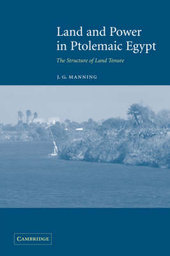
|
Land and Power in Ptolemaic Egypt: The Structure of Land Tenure
Hardback
Main Details
| Title |
Land and Power in Ptolemaic Egypt: The Structure of Land Tenure
|
| Authors and Contributors |
By (author) J. G. Manning
|
| Physical Properties |
| Format:Hardback | | Pages:360 | | Dimensions(mm): Height 229,Width 152 |
|
| Category/Genre | World history
African history |
|---|
| ISBN/Barcode |
9780521819244
|
| Classifications | Dewey:932.021 |
|---|
| Audience | | Professional & Vocational | |
|---|
| Illustrations |
13 Tables, unspecified; 2 Maps
|
|
Publishing Details |
| Publisher |
Cambridge University Press
|
| Imprint |
Cambridge University Press
|
| Publication Date |
29 May 2003 |
| Publication Country |
United Kingdom
|
Description
This history of land tenure under the Ptolemies explores the relationship between the new Ptolemaic state and the ancient traditions of landholding and tenure. Departing from the traditional emphasis on the Fayyum, it offers a coherent framework for understanding the structure of the Ptolemaic state, and thus of the economy as a whole. Drawing for the first time on both Greek and demotic papyri, as well as hieroglyphic inscriptions and theories taken from the social sciences, Professor Manning argues that the traditional central state 'despotic' model of the Egyptian economy is insufficient. The result is a subtler picture of the complex relationship between the demands of the new state and the ancient, locally-organized social structure of Egypt. By revealing the dynamics between central and local power in Egypt, the book shows that Ptolemaic economic power ultimately shaped Roman Egyptian social and economic institutions.
Author Biography
J. G. Manning is Assistant Professor of Ancient History at Stanford University and has published The Hauswaldt Papyri: A Third Century B.C. Family Dossier from Edfu (1997; 3924151059).
Reviews'... one of the most influential books in recent years.' Sehepunkte 'In this important book, Manning offers a fundamental reassessment of the economic basis of the Ptolemaic state, and of the ways in which the state exercised economic power at the local level.' The Journal of Egyptian Archaeology
|